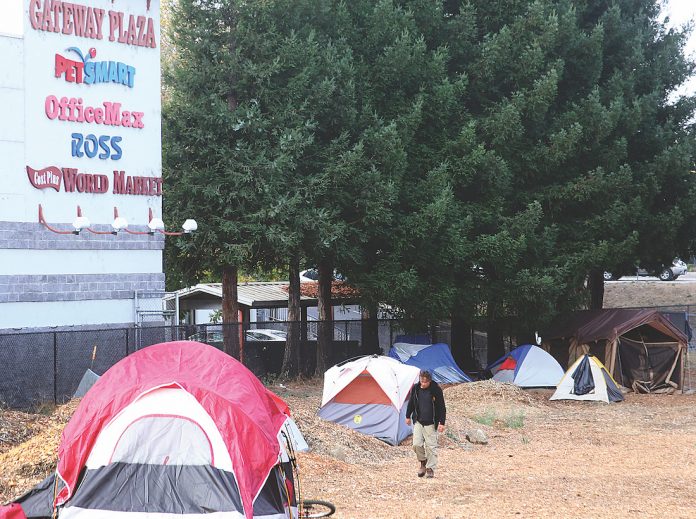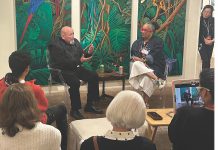
SANTA CRUZ—An unsanctioned homeless camp in Santa Cruz has reopened, this time with a new name, increased security and a set of rules designed to reduce crime and drug use.
Now called Camp Phoenix – after the mythological bird that rose anew out of its own ashes – the site at River Street and Highway 1 was opened last weekend with about 25 tents, about six months after city officials closed it. The number of tents had increased to about 40 by Wednesday morning.
The camp was relaunched after homeless advocate Deseire Quintero was killed by a falling tree on Oct. 27 as she camped in the woods near Pogonip.
Quintero was the lead plaintiff in a lawsuit against the City of Santa Cruz, in which a group of 10 people alleged the city had no alternative place for the camp residents to go if the camp was closed, and that “irreparable harm” would follow as the residents spread elsewhere into the city.
United States District Court Judge Edward Davila dismissed the case on Sept. 11.
In its previous incarnation, the camp held more than 200 people before the City forced the residents out in May. City workers later cleared thousands of pounds of garbage, contaminated soil and unclaimed property from the site.
The camp was widely criticized for its open-door policy, which allowed anyone to walk through the site at any time.
The area is now enclosed by a chain-link fence, and anyone who wants to use the space must pass through a gate, check in with a campground host and agree to abide by a list of rules. This includes no violence and no “constant” disruptive behavior. “Visible alcohol” is banned, as is illegal drugs and paraphernalia at the site and within a one-block radius.
Also, everyone who stays at the camp is expected to help with maintenance and operations. On Wednesday, that included spreading piles of wood chips throughout the space.
Camp host Lucero Luna was busy checking new residents in through the gate.
She pointed out a section of the campground reserved for disabled people, and an area designated non-smoking.
Luna also pointed out a space demarcated for a fire lane and said that the tents were spaced five feet apart by order of the fire marshall.
City officials stopped enforcing its overnight camping ban last year in light of Martin v. Boise, a 2017 ruling out of the 9th Circuit Court of Appeals Ninth Circuit, which held that people cannot be prosecuted for camping outside when they have no alternatives.
“They cannot touch us right now,” Luna said.
In a prepared statement, Santa Cruz City spokesman Ralph Dimarucut said that the city has not authorized “any form” of shelter campsite and that the City is reaching out to the campers to offer safe alternative sites. There are currently two, Dimarucut said, both run by the Salvation Army and both with vacancy.
Dimarucut said that the city will “make all possible efforts” to stop a campground from forming at the site.
“The City was forced to close the previous unsanctioned camp at this location due to significant health and public safety issues,” the statement said. “The City is monitoring the situation closely and will respond appropriately to avoid a similar situation from occurring again.”
On his website, Santa Cruz Police Chief Andy Mills said that the police must enforce the law, and that he respects the City Council’s decision to abide by the Boise decision and end its anti-camping ban.
“The police cannot enforce laws that do not exist,” Mills wrote. “Nor can we make laws up as we go, or enforce laws that do not fit the crime. We cannot use the power of the government in this fashion.”
Still, Mills said that he would support a new ordinance that addresses the nuisances that come from unsanctioned campsites while conforming to the court ruling.
The Santa Cruz City Council on Nov. 26 will consider such an amendment to the city’s camping ordinance, which is being written by the City Attorney in collaboration with the Police Department.
“Sleeping at night is one thing, but leaving tents up during the day and hauling in mounds of personal property, furniture, and miscellaneous equipment and material is an unattractive nuisance, and monopolizes public property in a way that is unfair to the rest of the community,” Mills said.
Advocates for the homeless residents have asked for donations of pallets, tents, tarps, sleeping bags, blankets, men’s clothing, headlamps, two-way radios, food and water.









